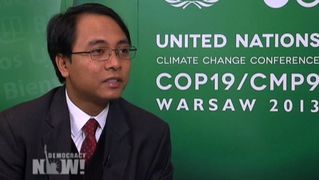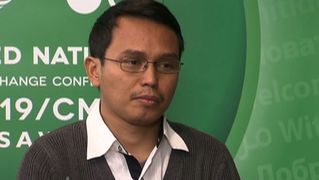Filipina Climate Chief: "It Feels Like We Are Negotiating on Who Is To Live and Who Is To Die"
Related Stories
Guests
Mary Ann Lucille Sering,
vice-chairperson and executive director of the Philippines Climate Change Commission.
DONATE →
This is viewer supported news
As aid workers in the Philippines continue to dig mass graves
amidst the search for possible survivors after Typhoon Haiyan, the
executive director of the Philippines Climate Change Commission, Mary
Ann Lucille Sering, gave a moving address today to her fellow climate
change delegates at the U.N. climate summit in Warsaw, Poland. "Every
time we attend this conference, I’m beginning to feel that we are
negotiating on who is to live and who is to die," Sering says.
Transcript
This is a rush transcript. Copy may not be in its final form.
AMY GOODMAN: This is Democracy Now!, democracynow.org, The War and Peace Report.
I’m Amy Goodman. We’re the only global TV-radio broadcast that is
spending the hour every day of this week here at the U.N. climate change
summit in Warsaw, Poland. I’m Amy Goodman.Just before our broadcast today, the executive director of the Philippines Climate Change Commission gave a moving address to fellow climate change delegates. This is Mary Ann Lucille Sering.
MARY ANN LUCILLE SERING: The timing of Typhoon Haiyan to these climate talks is impeccable. It is like some divine hand is trying to send us a message, reminding us why we are all here in the first place.
The world was united when we all signed this convention 21 years ago and when it came into force two years after. The main objective is to stabilize greenhouse gas concentrations in the atmosphere at a level that would prevent dangerous anthropogenic or human interference with the climate system.
Nineteen years has passed since the convention came into force. And if we are to review our progress, would it be right for me to conclude that we’ve failed miserably? Looking at science and how it manifested itself not only in Typhoon Haiyan, but also other events like Katrina in the United States, the heat wave in France, the wildfires in Australia, and other extreme events occurring after observed increased warming, should we not be all ashamed being here?
You cannot blame us for being impatient. We cannot go on negotiating every year without concrete action to avoid further warming. We now know that warming oceans fuel supertyphoons, and that, in all probability, is going to be the norm. We are forced to brace for these changes, even if it is not our fault. You see, if the developed countries have shown the leadership to reduce greenhouse gases at the onset of this convention, we, the most vulnerable, would not have to adapt. We would not have to ask or push for adaptation support.
I now ask this question: Is this convention still relevant to the times? Every time we attend this conference, I’m beginning to feel like we are negotiating on who is to live and who is to die.


No comments:
Post a Comment